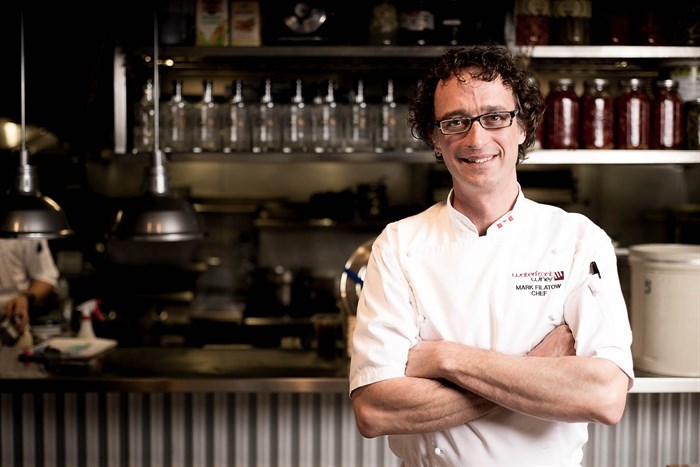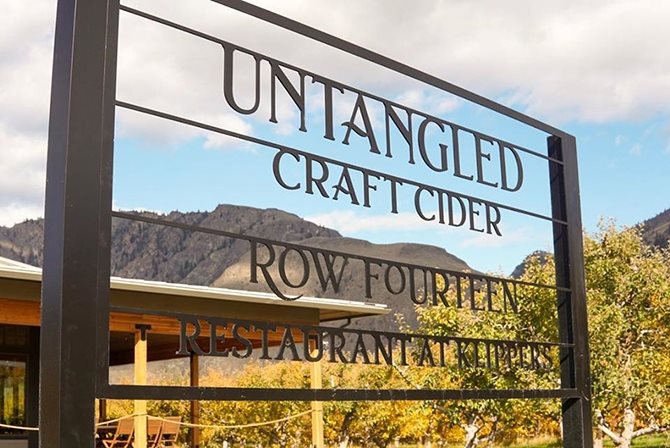For how much and how long? Okanagan restaurateurs struggle to make sense of what's next

Mark Filatow is one of the most highly lauded chefs in the Okanagan, known to continually raise the bar for local cuisine at his restaurant Waterfront Wines.
In this time that’s traditionally the lead-up to his busy season, the culinary innovation he's known for has taken on a new flavour.
Since COVID-19 regulations have prompted the closure of restaurants and bars, he created a menu that eschews complex, hard-to-deliver items in favour of frozen soups, sauces and dips people can stock up on, in addition to the occasional dinner for two, made fresh.
“We’ve been doing frozen soups at Okanagan Grocery for years, as well as hummus and a couple of dips,” he said.
The pandemic, however, sent what could be viewed as a steady evolution into warp speed, as he made more of these staples as a pandemic adaptation.
“A friend of mine, whose husband works in (Kelowna General Hospital), and will definitely be in contact with a COVID scenario said she knew families would be interested in stocking up for this time and now because kids are home-schooling, everyone is eating more from home,” he said.
While many others have chosen to focus on takeout and many are participating in nationwide campaigns, like #takeoutCanada, which encourages people to get take-away to help keep businesses active, he's found this path a better fit. It's a way of doing business that has a couple of advantages, health-wise and financially. He won’t have to worry about customers lining up for pick-up by controlling the delivery method. He also won't have to navigate the highs and lows of customer demand, and staff accordingly.
It's not a long-term solution, though.
Something will inevitably change, but what it will be remains to be seen — a fact made clear by provincial health officer Dr. Bonnie Henry, who said British Columbians are headed toward a new normal, with curtailed access to things they once took for granted, particularly when it comes to dining out.
“I think there are lots of innovative ways that we can have in-restaurant dining that protects both the staff and the people coming in and I’m looking to industry to come up with those ideas of how this could work,” Dr. Henry said at a press conference last week.
“It’s going to be a challenge, I understand, for many, particularly for small restaurants, in the coming months.”
Waterfront Wines is one of those small restaurants and the numbers being presented are something Filatow calls "interesting" but has yet to make sense of.
Among the troubling figures is the fact that currently fewer than 50 customers are allowed in one place at a time. Then, there’s the regulation that six feet of distance be kept between people.
Couple that with things like, the cost of his lease and other expenses, Filatow said things will be tight.
“Restaurants make their money when they’re busy and full,” he said. “How many can operate at 50 per cent capacity…. We only have from 5 p.m. to 9 p.m. to do business, so how will we generate enough business to stay afloat?”
“Will we do a blend of what we’re doing now and opening or will we keep doing the delivery system?” he said. “It’s going to require money and at a certain point the question will be how much and for how long? The danger for us in the Okanagan is we generally make our living in the summer and that gets us through the winter, so if we don’t have a busy summer, then how do we make it through the winter without topping up.”
Filatow said he’s lucky to have good landlords but that’s not the case across the board and individuals will have to start making tough decisions.
“I am not sure how it will work but I’ve been thinking about it a lot,” he said.
“Right now, we’re fine, we’re still open and things are still great."
That's not the case for everyone.
Restaurants like Cawston’s Row Fourteen are desperate to find a way to open their doors safely in the coming weeks, and make enough money to pay the bills, never mind a profit.
Row Fourteen opened to rave reviews from food critics in August last year. The restaurant’s unique menu, and reliance on a customer base that for the most part is kilometres away from the restaurant’s Similkameen Valley location, presents even more challenges to operating in a COVID-19 environment.
Owner-managers Kevin Klippenstein said he and partners Annamarie Klippenstein and Chef Derek Gray are also investigating different avenues of business, including looking at other menu items for take out, Klippenstein said.
“We have to do something. We have all these expenses and no income."
Social distancing measures will be somewhat easy to meet once the business gets underway again, but there are other challenges for them.
“We opened in August last year, and most of 2019 was a write off. We didn’t make enough to pay the bills, but that was written into our business plan. It was a new business, we knew we had to put money into startup costs, but we were expecting a good year this year to recoup our losses," he said. "Instead, we were shut down in March. Now our reservations are cancelled until the end of May, and the $40,000 loan we got from the government went pretty quickly to outstanding bills.”
The restaurant is unable to take advantage of the federal government’s wage subsidy because the restaurant was closed through the winter, something Klippenstein says will probably affect a number of Okanagan small business owners who close in the off season.
The restaurant is even more vulnerable because it just opened last August.
“We have loans for startup costs, and equipment leases that we wouldn’t have a few years down the road,” he says. “We have to do something to generate some kind of revenue. We’re in a position, if we turn the lights on and power up the grill, are we going to make enough to cover our costs? Or are we just going to go more in the hole?”
B.C. Restaurant and Food Services Association president and CEO Ian Tostenson told iNFOnews.ca 25 people from around the province are charting a plan that will offer some clarity on lingering questions. As is, about 10 per cent of restaurants have closed permanently in B.C., he said, but that could rise to 20 to 25 per cent as the lockdown continues.
It’s a choice between losing a lot of money, being close to breaking even or even making a bit of money, he noted.
At this point, everything is up for discussion. If, for example, there have to be Plexiglass barriers at bars to protect the workers, that’s a possibility.
“This is stage one,” Tostenson said. “This is not, as Dr. Henry said, the permanent plan. So how well can we do this? Let’s do this exceptionally well so that we can get the confidence of the public and the confidence of Dr. Henry, ultimately, and then she’ll say, OK, let’s go to 100 people, or let’s start operating a bit more towards capacity.”
To contact a reporter for this story, email Kathy Michaels or call 250-718-0428 or email the editor. You can also submit photos, videos or news tips to the newsroom and be entered to win a monthly prize draw.
We welcome your comments and opinions on our stories but play nice. We won't censor or delete comments unless they contain off-topic statements or links, unnecessary vulgarity, false facts, spam or obviously fake profiles. If you have any concerns about what you see in comments, email the editor in the link above.



